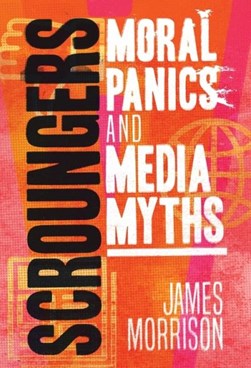-
BROWSE 1000s OF BOOKS IN STOCK
-
FREE DELIVERY ON ORDERS OVER €10
-
PRE-ORDER OBSESSED BY JOHNNY SEXTON
Scroungers
Hardback
Scroungers, spongers, parasites . These are just are some of the terms that are typically used, with increasing frequency, to describe the most vulnerable in our society, whether they be the sick, the disabled, or the unemployed. Long a popular scapegoat for all manner of social ills, under austerity we've seen hostility towards benefit claimants reach new levels of hysteria, with the 'undeserving poor' blamed for everything from crime to even rising levels of child abuse. While the tabloid press has played its role in fuelling this hysteria, the proliferation of social media has added a disturbing new dimension to this process, spreading and reinforcing scare stories, while normalising the perception of poverty as a form of 'deviancy' that runs contrary to the neoliberal agenda. Provocative and illuminating, Scroungers explores and analyses the ways in which the poor are portrayed both in print and online, placing these attitudes in a wider breakdown of social trust and community cohesion.
€123.25

369 Reward Points
In stock online
Extended Range: Delivery in 2-3 working days
Extended Range: Delivery in 2-3 working days
Free Delivery on this item
Any purchases for more than €10 are eligible for free delivery anywhere in the UK or Ireland!
Scroungers, spongers, parasites . These are just are some of the terms that are typically used, with increasing frequency, to describe the most vulnerable in our society, whether they be the sick, the disabled, or the unemployed. Long a popular scapegoat for all manner of social ills, under austerity we've seen hostility towards benefit claimants reach new levels of hysteria, with the 'undeserving poor' blamed for everything from crime to even rising levels of child abuse. While the tabloid press has played its role in fuelling this hysteria, the proliferation of social media has added a disturbing new dimension to this process, spreading and reinforcing scare stories, while normalising the perception of poverty as a form of 'deviancy' that runs contrary to the neoliberal agenda. Provocative and illuminating, Scroungers explores and analyses the ways in which the poor are portrayed both in print and online, placing these attitudes in a wider breakdown of social trust and community cohesion.

369 Reward Points
Any purchases for more than €10 are eligible for free delivery anywhere in the UK or Ireland!
€123.25

369 Reward Points
Any purchases for more than €10 are eligible for free delivery anywhere in the UK or Ireland!
Product Description
Scroungers, spongers, parasites . These are just are some of the terms that are typically used, with increasing frequency, to describe the most vulnerable in our society, whether they be the sick, the disabled, or the unemployed. Long a popular scapegoat for all manner of social ills, under austerity we've seen hostility towards benefit claimants reach new levels of hysteria, with the 'undeserving poor' blamed for everything from crime to even rising levels of child abuse. While the tabloid press has played its role in fuelling this hysteria, the proliferation of social media has added a disturbing new dimension to this process, spreading and reinforcing scare stories, while normalising the perception of poverty as a form of 'deviancy' that runs contrary to the neoliberal agenda. Provocative and illuminating, Scroungers explores and analyses the ways in which the poor are portrayed both in print and online, placing these attitudes in a wider breakdown of social trust and community cohesion.
Product Details
ISBN9781786992147
FormatHardback
PublisherZED BOOKS (15 February. 2019)
No. of Pages332
Weight576
Language English
Dimensions 222 x 140 x 29

